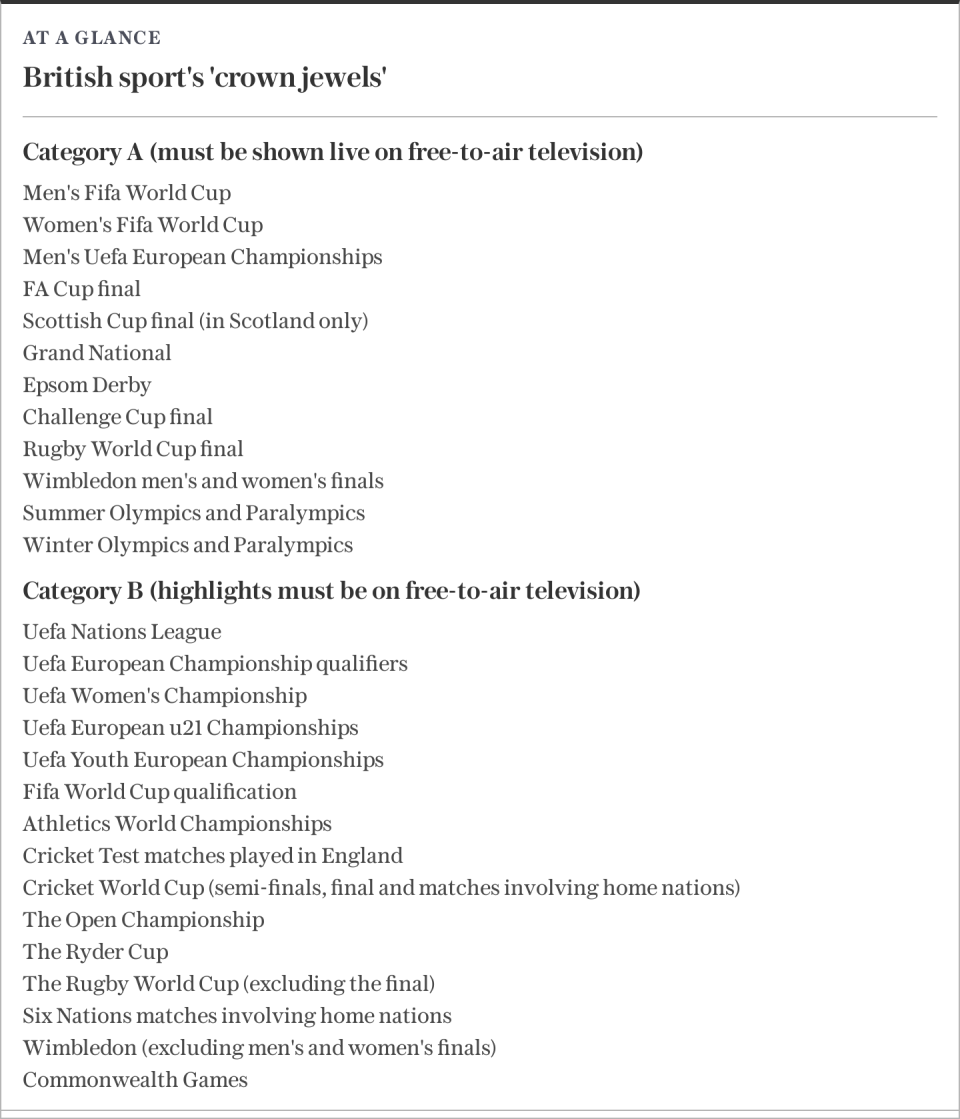Blow to BBC as Six Nations is refused ‘Crown Jewels’ status

The BBC’s hopes of retaining the Six Nations have suffered a further blow after the Government rejected calls to protect it from the threat of pay-TV.
Ministers ignored pleas from MPs and those who have played in and broadcast the iconic competition to add it to the so-called ‘Crown Jewels’ list of sporting events that can only be shown live on free-to-air television.
The calls came after the BBC’s outgoing director of sport, Barbara Slater, warned that it faced a fight to retain the Six Nations and her counterpart at joint rights holder ITV, Niall Sloane, said there were “well-founded” fears that the competition could be lost from terrestrial television.
That followed the news, first revealed by Telegraph Sport, that the tournament could be sold alongside a new world league, increasing the chances of it not remaining entirely free-to-air.
But a spokesperson for the Department for Culture, Media & Sport (DCMS) said: “The listed events regime means many of the biggest sports events are available to watch for free throughout the UK. Our goal is to ensure events of national interest are free-to-air wherever possible, while protecting competition organisers’ ability to raise income from the sale of broadcast rights to invest in their sports.
“We believe the current list strikes an appropriate balance, with protections in place for highlights of the Six Nations tournament and live coverage of the Rugby World Cup final, and therefore have no plans to amend the regime.”
‘Fans don’t want just to see a few highlights’
Slater and Sloane spoke while giving evidence this week before the Culture, Media and Sport select committee, the chair of which is now leading calls for the Six Nations to be protected by law.
Dame Caroline Dinenage MP, who was a Government minister at DCMS between February 2020 and September 2021, said: “It was worrying to hear from the BBC that Six Nations matches are at risk of disappearing from terrestrial TV. With the annual excitement of watching our four home nations battling it out, alongside France and Italy, it is difficult to argue that this isn’t one of the UK’s sporting Crown Jewels.
“Fans don’t want just to see a few highlights, with the real action hidden on pay-TV. If the risk of losing the Six Nations becomes real, I hope that the Government will look again at listing it as a Category A event, to protect its terrestrial future.”

Committee colleague Kevin Brennan, a shadow justice minister and also a member of the last Labour government, raised the matter in Parliament on Thursday, saying: “Isn’t it about time the Government added the Six Nations rugby tournament, which is a festival of friendship across these islands, and in Europe, to the Listed Events regime?”
Penny Mordaunt, the Leader of the House, responded: “Well, the honourable gentleman’s suggestion got a lot of support from across the house there. It is the most fantastic tournament of friendship but also friendly rivalries, too.
“I will certainly make sure that the Secretary of State for DCMS has heard his suggestion.”
Scotland great Kenny Logan, whose wife, Gabby, anchors the BBC’s Six Nations coverage, said: “The Six Nations must remain free-to-air. If the Six Nations wasn’t free-to-air, they would lose a hell of a lot of viewers.
“On a Friday night – England-Wales – nine million people. Sponsors need that. Sponsors want the eyeballs and I think it would be a big call to go on pay TV.
“I know they’re all desperate to try to find a way to get more money. But, from a sponsors’ point of view, they want eyeballs. And once eyeballs disappear, slowly sponsorship starts to go down.
“Rugby needs more eyeballs. It doesn’t need less.”
‘To hide the sport behind a paywall would be hugely risky’
Wales legend Jonathan Davies, a BBC Six Nations pundit, said: “I’ve grown up watching it, then I’ve played in it, and then I’ve commentated on it. It’s an amazing tournament and it would be very sad if it was lost from terrestrial television.”
ITV Six Nations anchor Mark Pougatch added: “The viewing figures for the Six Nations and recent World Cup just emphasise the reach and breadth of interest in rugby union. Free-to-air television is the only medium that can support those huge numbers at a time the game critically needs all the supporters it can muster. To hide the sport behind a paywall at this stage of its history would be a hugely risky move.”
BBC and Amazon touchline reporter Sonja McLaughlan also posted on X: “If tv rights for 6N and new World League are to be bundled together who can afford it? (Last 6N deal alone cost £460m) Plus can the sport truly afford to lose FTA [free-to-air] coverage? Personally think 6N should be a listed event it’s that special.”
Renewed calls to make the Six Nations free-to-air by law came a month after another parliamentary select committee publicly stated it must remain on terrestrial television.
That demand was made by MPs on the Welsh Affairs Committee, after a UK minister had earlier indicated Wales games could be preserved for terrestrial coverage by law if the principality’s parliament formally requested it.


